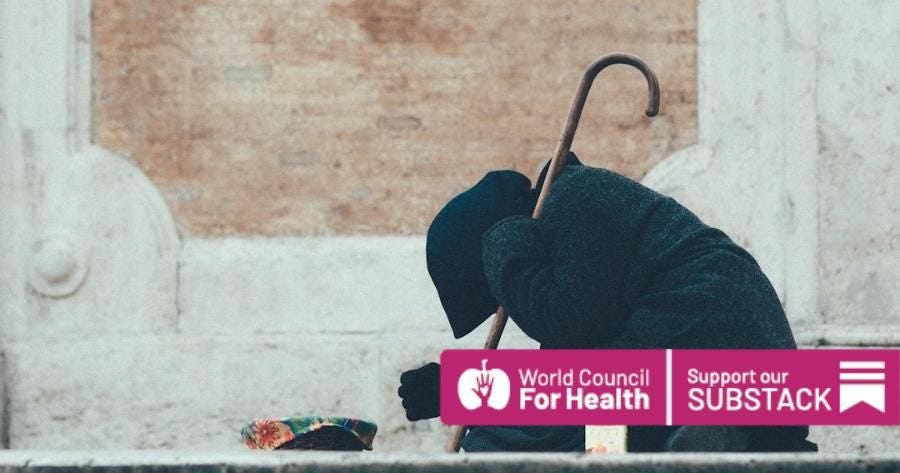Christof Plothe DO
As the world spins on its axis, a stark reality unfolds beneath the glittering surface of wealth and prosperity. While the super-rich continue to amass fortunes that boggle the mind, a staggering 3.6 billion people—nearly 44% of humanity—remain trapped beneath the World Bank's extended poverty line of $6.85 a day. This figure has remained unchanged since 1990, a haunting testament to the stagnation of progress in the face of rampant inequality.
The hunger games of poverty
In a world where billionaires are celebrated as titans of industry, 733 million people are forced to confront the grim specter of hunger, a number that has surged by 152 million since 2019. This is not just a statistic; it’s a clarion call for action.
Women, in particular, bear the brunt of this crisis, often finding themselves at the intersection of gender and economic inequality. The irony is palpable: as the rich dine on gourmet meals, millions struggle to find their next bite.
Daily living costs in Western Europe with those in Africa and Asia
Western Europe has become one of the most affordable, cheapest regions for daily living costs, particularly when compared to North America and major cities in Asia, where expenses can be significantly higher. While some African countries may offer lower overall costs, challenges such as limited access to goods and services can impact lifestyle quality. In contrast, bustling cities in Asia often grapple with steep costs for housing and basic goods. But with the daily living costs of food and housing in Europe rising, people have started to struggle with their daily survival.
A century of struggle?
The World Bank paints a bleak picture: if current economic growth rates persist and inequality remains unaddressed, it could take over a century to eradicate poverty. Imagine that—a hundred years of struggle, while the elite continue to thrive.
But what if we could change the narrative? The World Bank suggests that poverty could be eliminated three times faster if we tackle inequality head-on.
The power of change
As Albert Einstein once said, "We cannot solve our problems with the same thinking we used when we created them." This is where the conversation shifts from despair to hope. The potential for change lies not just in economic growth, but in the redistribution of wealth and resources.
The question we must ask ourselves is: What kind of world do we want to create? A world where the rich get richer, or one where everyone has a fair shot at a decent life?
The call to action
Self-sufficiency and decentralized organic agriculture are fundamental to achieving true sovereignty. Unfortunately, many people have lost the knowledge of traditional living methods, primarily due to industrialization, which fosters dependency rather than independence.

I believe the key to revitalizing our relationship with the land lies in utilizing traditional seeds and agricultural methods while merging them with contemporary knowledge about sustainable agriculture. This approach benefits not only the soil and microbiome but also the insects, plants, and humans who rely on these ecosystems. Additionally, having decentralized access to clean energy, food, and water is crucial, as it serves as the foundation for starting local economies that can effectively drive people out of poverty.
It is crucial to amplify the voices of those who are often silenced
We must advocate for policies that prioritize the needs of the many over the whims of the few. This isn't merely an act of charity; it's a matter of justice. Recognizing that the fight against poverty is intrinsically linked to the fight against inequality is essential.
The stark contrast between the super-rich and the impoverished masses is not just a statistic - it is a narrative that demands our attention. As we navigate this complex landscape, let us remember that the power to change the world lies in our hands.
Together, we can forge a future where prosperity is not a privilege for the few, but a right for all. The World Council for Health advocates for a decentralized approach that can empower everyone. For more on this, visit our webpage on Country Councils. By embracing sustainable practices and prioritizing community-driven initiatives, we can work towards a healthier and more equitable world for all.
Source:
Oxfam International Report on Inequality: Oxfam Inequality Report
"Takers, Not Makers" report by Oxfam: Oxfam Takers, Not Makers
World Economic Forum Coverage of Oxfam's Findings: World Economic Forum - Oxfam Findings
Oxfam's Inequality Inc. Report: Oxfam Inequality Inc.
Oxfam's Annual Inequality Report: Oxfam Annual Inequality Report





Your link to the World Economic Forum Coverage of Oxfam's Findings does not work
Sorry but this is a simplistic Marxist sounding rant. "A world where the rich get richer, or one where everyone has a fair shot at a decent life?" It does not have to be an either/or situation. The most important thing is that everyone gets a fair shot but that does not mean that the rich won't get richer; that is a separate issue. The problem is that the rich/powerful have too much power and use that to protect their position, not necessarily to 'oppress the masses'